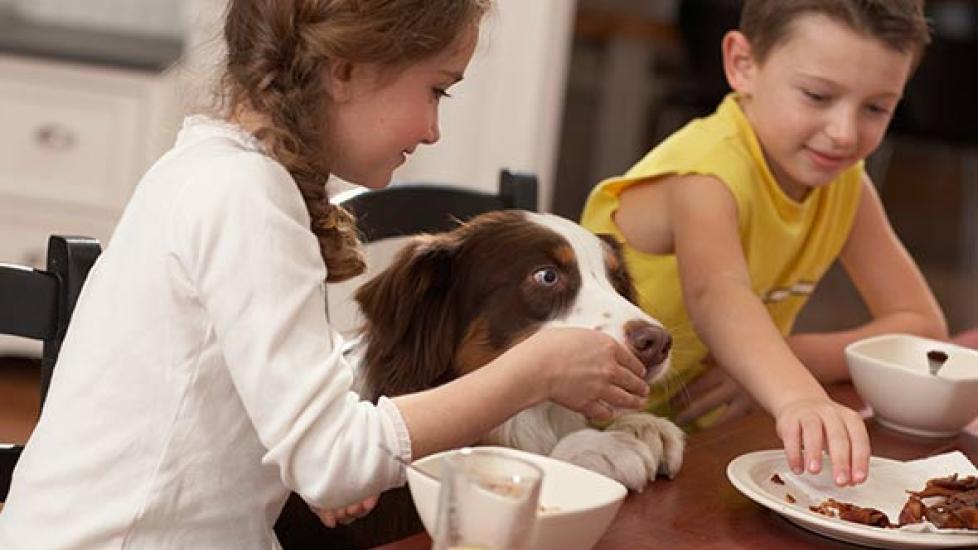Why Dogs Should NOT Eat ‘People Food’
“Love hurts,” or, in the case of feeding your dog “table food,” love can kill, slowly. We all want to show our pets how much we love them and help them to feel more a part of the family. So we slip them a little treat off our plate—but only on holidays… and then when they are really well behaved during a party, and soon we find ourselves feeding Fido daily off our own plate.
While the food you are sharing with your dog may not technically be considered harmful to its health, it is slowly causing adverse side effects— physically, behaviorally, and socially.
Behavior:
Believe it or not, our pets have us trained pretty well. We pet them when they nudge us, take them out when they bark, and give them treats when they whine. When we start to feed our pets from our plate, counter, anywhere not in their own food bowl, or food that is anything other than their normal dog food, we start to introduce bad habits that can be difficult to break.
Dogs will begin to beg for food while we eat, cook, or snack. This can occur at all times, especially when they see YOU holding or eating food. They will whine, sit and stare, jump up, run around, anything to get your attention in hopes of getting you to drop a yummy morsel of food. At some point, you may even share food with them just to get them to stop these annoying behaviors. This will actually reinforce their bad behavior.
Dogs, like children, will realize that if they do X (whine, cry, beg), human will do Y (feed me, drop food, etc.). Breaking this behavior can be extremely difficult and time consuming; it is best to never start it in the first place.
Health problems:
Not only are we setting up our pets to behave badly, we are introducing the possibility of eating toxic foods, as well as an increase in daily calories.
Generally, the dogs I see at the veterinary office, or the dogs I pet-sit for, that eat only dog food tend to have better body condition scores and are at a more appropriate weight for their size, age, and/or breed. Dogs that are kept at an optimum weight are less likely to have joint, bone, ligament, or mobility issues, and are less likely to develop heart disease, breathing issues, decreased liver function, and many other health problems. Just like humans, maintaining a healthy weight helps ensure a dog’s overall health and longevity.
Dogs that are not fed people food are less likely to eat toxic foods. While I do not have any scientific evidence, I base this on the more than a decade of veterinary expertise and first-hand experience.
For example, I know a couple with a dog that begged at the table morning, noon, and night. They thought it was cute and loved seeing all the “tricks” their dog would do just for a little scrap of food. One evening they were hosting a party and the guests thought that it was adorable to watch the pup spin and hop and beg everyone for treats—that is, until the owners found out their guests were giving grapes to their dog as a treat! Grapes are highly toxic and their toxicity in a dog can be unpredictable. Fortunately, they were able to get the dog immediate treatment and there was a happy ending.
Picky eaters:
Share too many of your delicious foods and your dog may become a picky eater and not want to eat their own food, especially if they know there may be something better on the menu if they hold out long enough. I have seen this happen more times than I can count; owners calling the vet office because Fido won’t eat his food, but he will eat chicken, beef, eggs, or anything else they offer from the menu.
After a comprehensive physical exam, the doctor will not find any medical reason why Fido won’t eat his kibble and will suggest a trip to the behaviorist. Generally if the vet can discover the dog’s eating habits, or the owners confess they feed Fido from their own plates, the answer is all too clear: Fido has decided he wants the “good food” and not his generic kibble.
Again, this behavior can be difficult to break and can even cause adverse physical side effects if the dog does not eat for long periods of time or is not receiving the appropriate nutrition.
Overall, while it is not horrible if your dog eats the occasional “people food,” to avoid future problems, it’s best to keep Fido strictly on dog food.
